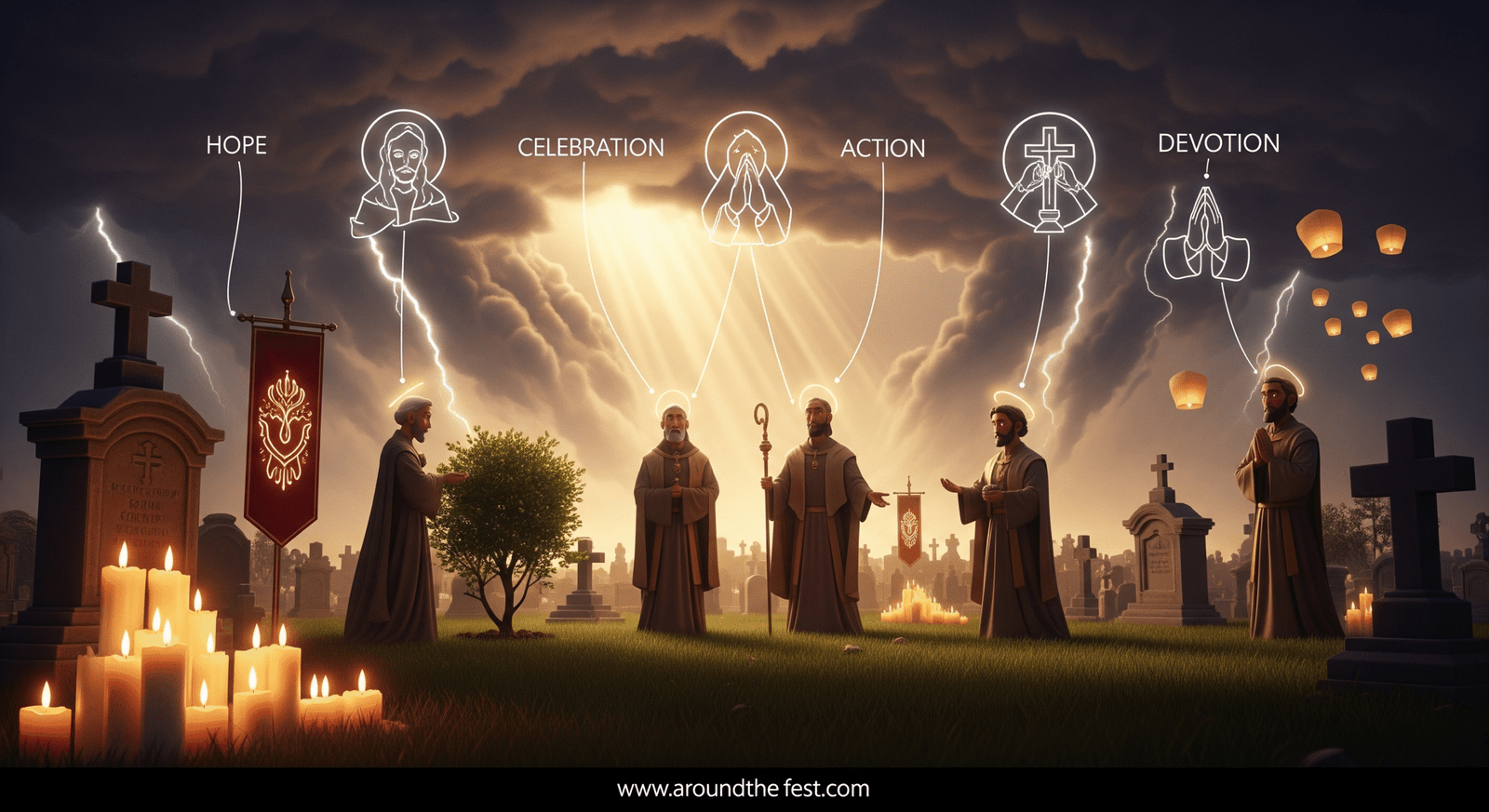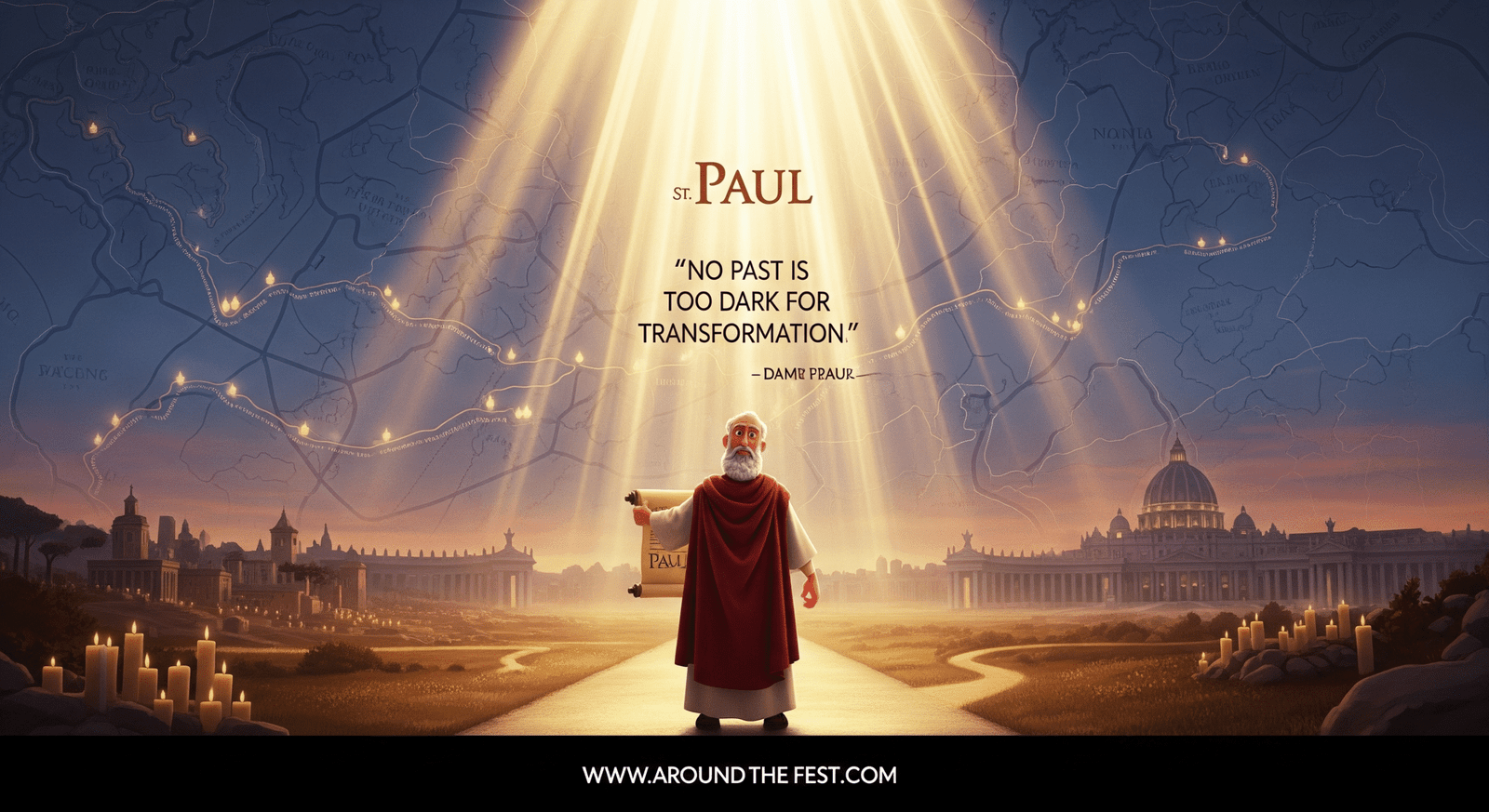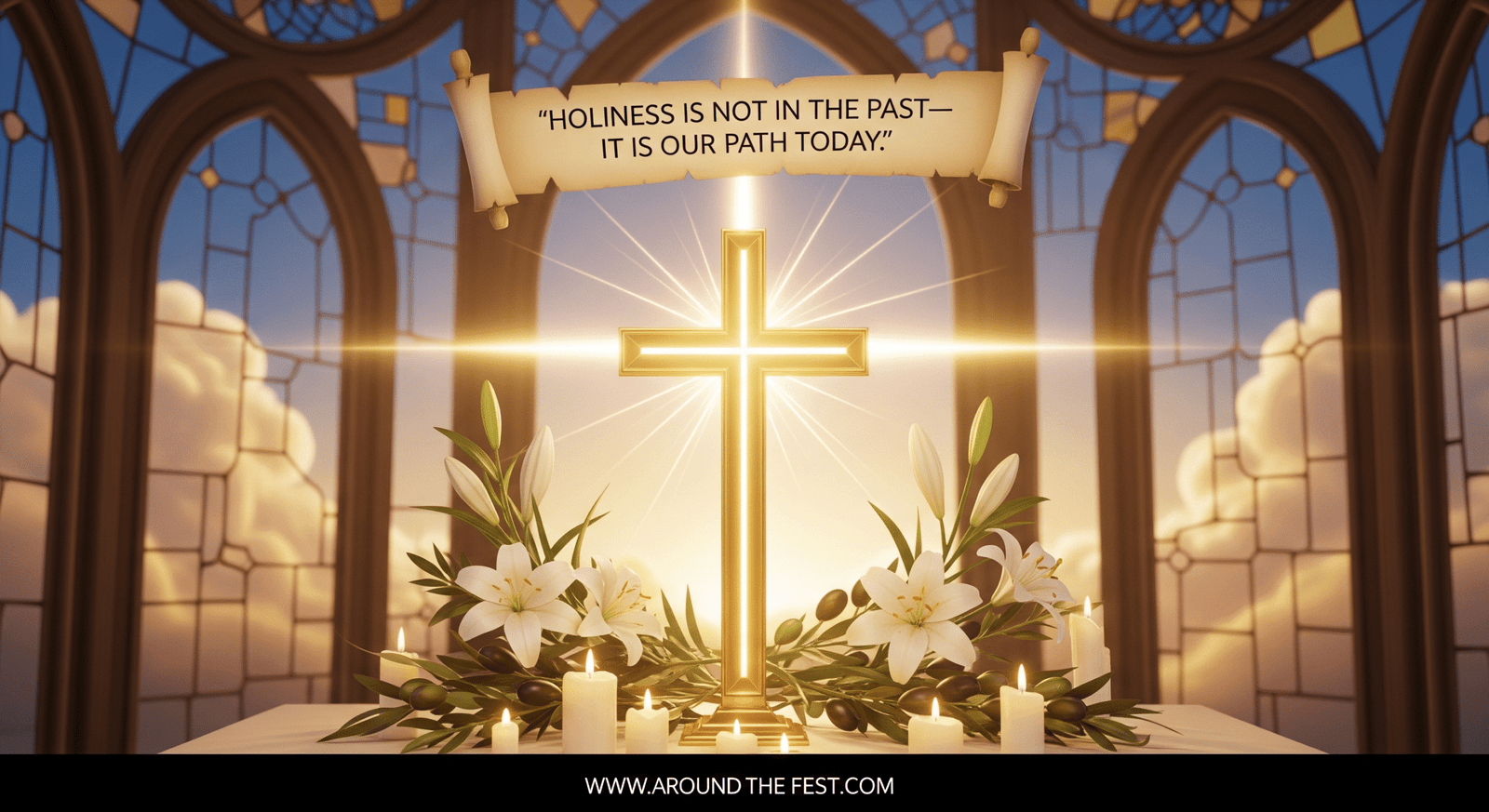Top Saints All Saints’ Day: 2025 Guide to Inspiration and Faith
Introduction: Why Learning About Saints Still Matters
Every year on November 1st, Christians pause to celebrate All Saints’ Day. This solemn feast honors the countless men and women who lived with holiness and left examples of courage, faith, and service.
In 2025, the celebration comes at a time when people are searching for renewed inspiration. With global challenges, cultural divisions, and personal struggles, many of us are hungry for role models who prove that living with purpose is still possible.
But here’s the challenge: Catholic tradition recognizes thousands of saints, with countless more unsung. That number can feel overwhelming. Which ones should you focus on? And more importantly, how can their stories guide your life today?
That’s where this guide helps. We’ve chosen the Top 10 Saints to Learn About on All Saints’ Day 2025. The list blends legendary figures from the early Church with modern heroes like Padre Pio and St. Oscar Romero.

Each profile includes:
- A short biography to set the scene.
- Key lessons for modern life (leadership, prayer, courage, justice).
- Practical ways to honor or learn more this All Saints’ Day.
By the end, you’ll not only know who these saints are—you’ll also discover meaningful ways to integrate their wisdom into your faith journey in 2025.
Why All Saints’ Day Matters in 2025

Before diving into the saints, let’s reflect on why this feast still matters today.
A reminder of hope: The world feels heavy in 2025. Climate change, wars, and digital burnout weigh on our hearts. Saints remind us that ordinary people can rise above their struggles and live with extraordinary purpose.
A universal celebration: All Saints’ Day is marked around the globe. In Poland, families gather in candlelit cemeteries. In the Philippines, people visit colorful tombs. Together, these traditions show that holiness transcends culture.
A call to action: Saints aren’t meant to stay in stained-glass windows. They challenge us to live differently—whether by forgiving like St. Peter, caring for creation like St. Francis, or standing up for justice like St. Óscar Romero.
Growing devotion today: Pew Research shows that devotion to saints remains strong. Many Catholics pray for saintly intercession every month.
In short, All Saints’ Day 2025 is more than a historical feast. It’s an invitation to find role models for our time—holy men and women who prove that holiness is not outdated but urgently relevant.
1. St. Peter — Leadership and Forgiveness (c. 1 BC – AD 64)

St. Peter, the fisherman-turned-apostle, is known for his boldness, humanity, and imperfections. Despite denying Jesus three times, he was chosen to be the rock upon which the Church was built, proving that God calls the flawed and transforms them into leaders.
- Nationality: Jewish (from Bethsaida, Galilee)
- Focus: Leadership, faith, and forgiveness
Life story:
- Originally a fisherman, Peter was called by Jesus to be a “fisher of men.”
- He became one of Jesus’ closest disciples and a key leader in the early Church.
- Despite his devotion, he denied Jesus three times during the Passion but was later restored.
- He eventually became the first pope and was martyred in Rome.
Key contributions:
- Leadership in spreading Christianity after Jesus’ resurrection.
- Model of human weakness and God’s forgiveness.
- Writings include two New Testament epistles emphasizing faith, hope, and love.
Key Lessons from Peter’s Life:
- Leadership Through Humility: True leadership is not about perfection but about serving others with courage and integrity.
- Power of Forgiveness: Mistakes are opportunities for growth, not permanent setbacks.
- Resilience: Peter’s journey shows that second chances are always possible.
Lessons for today:
- True leadership involves humility, courage, and the ability to forgive yourself and others.
- Mistakes don’t disqualify you; God’s grace allows for restoration.
- Courage and faith can guide you to take responsibility and lead with love.
Ways to honor or reflect:
- Pray for guidance in leadership and for the strength to forgive.
- Reflect on moments when you have stumbled and how forgiveness restored your path.
- Read 1 & 2 Peter for encouragement in faith, resilience, and humility.
- Read Gospel passages about Peter (Matthew 16, John 21) for inspiration.
Peter demonstrates that God doesn’t call the perfect—He equips those who are willing.
All Saints’ Day Tradition Box:
Poland: Families light candles on graves, reflecting Peter’s example of hope and second chances.
Saint & Modern Issue: Forgiveness in leadership and personal failures.
2. St. Paul — Conversion and Mission (c. 5–67 AD)

St. Paul’s life is a testament to radical transformation. Once a fierce persecutor of Christians, his encounter with Christ on the road to Damascus changed him into one of Christianity’s greatest evangelists. His letters continue to guide and inspire believers worldwide.
- Nationality: Jewish, Roman citizen (born in Tarsus, modern-day Turkey)
- Focus: Conversion, evangelization, and mission
Life story:
- Originally named Saul, he was a Pharisee who persecuted early Christians.
- On the road to Damascus, he experienced a dramatic conversion and became a devoted follower of Christ.
- Paul traveled extensively, preaching the Gospel across the Roman Empire and establishing Christian communities.
- He was imprisoned multiple times and eventually martyred in Rome.
Key contributions:
- Authored many New Testament letters (epistles) that guide Christian faith and practice.
- Emphasized grace, faith, and the universal call to salvation.
- Modeled tireless missionary work and adaptability in spreading the Gospel.
Lessons for today:
- Transformation is always possible, no matter your past.
- Purpose can emerge through service and commitment to a greater mission.
- Courage and perseverance are essential in sharing your values and beliefs.
Ways to honor or reflect:
- Read passages from Paul’s epistles (e.g., Romans, Corinthians, Philippians) for inspiration.
- Reflect on your own journey of personal growth or change.
- Engage in acts of service, mission work, or advocacy to put faith into action.Journal about areas where you seek change or growth.
- Share your values or faith with someone in need of encouragement.
Paul proves that transformation is possible, and our greatest weaknesses can become our greatest strengths.
Key Lessons from Paul’s Life:
- Power of Transformation: No one is beyond redemption; past mistakes can become sources of strength.
- Faith and Perseverance: Paul’s unwavering dedication shows how to live with purpose amid challenges.
- Unity and Mission: His letters emphasize the importance of building community and sharing faith.
Relevance for Today:
Paul speaks to anyone who has ever felt stuck in old habits or weighed down by a past mistake. His radical conversion shows that no one is beyond redemption. In a fast-changing, polarized world, his emphasis on faith, unity, and perseverance feels especially relevant.
Saint & Modern Issue: Personal transformation and perseverance.
Family-Friendly Idea: Kids’ journaling activity—write a “letter to your future self” inspired by Paul.
Local Tradition: Italy’s Vatican-led All Saints’ Day events highlight his global impact.
3. St. Francis of Assisi — Care for Creation (1181/1182–1226)

St. Francis of Assisi, born into wealth, renounced everything to embrace a life of simplicity and love for all creation. Founder of the Franciscan Order, he is remembered for humility, joy, and his deep care for animals and the environment.
Nationality: Italian
Focus: Simplicity, humility, and care for creation
Life story:
- Born into a wealthy family in Assisi, Italy, Francis renounced his inheritance to live a life of poverty and service.
- He founded the Franciscan Order, emphasizing humility, compassion, and closeness to God.
- Known for his deep love for animals, nature, and the environment.
- Believed all of creation reflects God’s glory.
Key contributions:
- Established the Franciscan Order, inspiring centuries of religious devotion and social service.
- Wrote prayers and poems celebrating God’s creation, including the famous Canticle of the Sun.
- Advocated for peace, simplicity, and ecological stewardship.
Lessons for today:
- Live simply and appreciate the natural world as a gift.
- Show compassion for all living beings, big or small.
- Embrace humility and service as pathways to spiritual fulfillment.
Ways to honor or reflect:
- Spend time in nature, reflecting on its beauty and interconnectedness.
- Volunteer for environmental or animal welfare causes.
- Read or meditate on Francis’ prayers and writings about creation.
- Plant a tree or start an eco-friendly habit.
- Pray the Canticle of the Sun.
- Spend quiet time in nature, seeing it as sacred.
Francis inspires us to rediscover joy and holiness in ordinary, everyday moments.
Key Lessons from Francis’ Life:
- Simplicity: True happiness comes from living lightly and with gratitude.
- Love of Creation: Every creature reflects God’s glory.
- Joyful Spirit: Holiness is expressed through compassion, humility, and delight in life’s small moments.
Relevance for Today:
In 2025, with climate change dominating headlines, Francis feels more relevant than ever. Pope Francis even drew on him as inspiration for the encyclical Laudato Si’, calling for care of “our common home.” Francis shows us that protecting creation is not just political—it’s deeply spiritual.
Saint & Modern Issue: Climate crisis & environmental stewardship.
Local Tradition: Italy often celebrates with blessings of animals on Oct 4—perfect for Francis’ followers.
4. St. Teresa of Ávila — Prayer and Interior Life (1515–1582)

St. Teresa of Ávila, a 16th-century Carmelite nun, is renowned for her mystical writings, including The Interior Castle, and her reform of the Carmelite order. She emphasized deep, contemplative prayer and a personal relationship with God.
- Nationality: Spanish
- Focus: Prayer, contemplation, and interior spiritual life
Life story:
- Born in Ávila, Spain, Teresa entered the Carmelite convent as a young woman.
- She experienced profound mystical visions and developed a deep life of prayer.
- Faced resistance while reforming the Carmelite Order to emphasize strict discipline and devotion.
- Recognized as one of the great doctors of the Church for her writings on spirituality.
Key contributions:
- Authored spiritual classics such as The Interior Castle and The Way of Perfection.
- Emphasized personal prayer, meditation, and union with God.
- Reformed Carmelite convents across Spain, inspiring generations of religious followers.
Lessons for today:
- Inner reflection and prayer strengthen your connection with God.
- Spiritual growth often requires discipline, patience, and perseverance.
- Deepening your interior life can bring peace amid life’s chaos.
Ways to honor or reflect:
- Set aside time daily for prayer or meditation.
- Read The Interior Castle to explore her teachings on spiritual growth.
- Practice mindfulness and self-examination to cultivate inner peace.
- Dedicate 10 minutes to silent meditation or centering prayer.
- Practice short, heartfelt prayers throughout the day.
Teresa shows that peace and spiritual renewal are achievable, even in a busy, noisy world.
Key Lessons from Teresa’s Life:
- Power of Contemplation: Prayer is more than words; it’s about connecting with God in silence.
- Inner Renewal: True spiritual growth begins within the soul.
- Focus Amid Distraction: Teresa teaches that holiness can flourish even in chaotic surroundings.
Relevance for Today:
In 2025, constant notifications, social media noise, and busy schedules make stillness a rare gift. Teresa’s life is a bold reminder that prayer isn’t about reciting words quickly—it’s about cultivating a relationship with God in silence and trust.
Saint & Modern Issue: Mental health, mindfulness, and prayer practices.
Family Activity: Guide kids in a “quiet reflection corner” for 5–10 minutes, inspired by Teresa.
5. St. Augustine — Seeking Meaning in a Restless World (354–430)

St. Augustine of Hippo is best known for his restless heart. Before becoming a bishop and theologian, he pursued pleasure, power, and intellectual pride. His dramatic conversion and writings—especially Confessions—continue to inspire seekers everywhere.
- Nationality: Roman (modern-day Algeria)
- Focus: Faith, reason, and the search for truth
- Life story:
- Born in Tagaste (North Africa), Augustine led a restless youth filled with worldly pleasures and philosophical searching.
- He struggled with questions about life, morality, and God before converting to Christianity.
- Baptized by St. Ambrose in 387, he became a priest, bishop, and one of the Church’s greatest theologians.
Key contributions:
- Writings include Confessions (a spiritual autobiography) and The City of God (exploring the role of Christianity in society).
- Emphasized the journey of the soul, grace, and finding meaning in God.
- Influenced Western philosophy and Christian theology for centuries.
Key Lessons from Augustine’s Life:
- Restless Heart: True fulfillment comes from seeking God, not worldly achievements.
- Honest Reflection: Self-examination is a path to understanding and growth.
- Faith Through Struggle: Even the most wandering souls can find purpose in God.
Lessons for today:
Augustine’s famous line, “Our hearts are restless until they rest in You, O Lord,” resonates deeply in 2025. Many of us chase success, possessions, or social validation, only to feel unfulfilled. Augustine reminds us that true peace comes from aligning our lives with God, not the fleeting trends of the world.
Ways to honor or reflect:
- Write your own “confession”: reflect on where you seek meaning.
- Read excerpts from Confessions, especially his conversion story.
- Pray for wisdom to discern lasting purpose over temporary satisfaction.
- Augustine proves that seeking, questioning, and even stumbling can lead us closer to truth and fulfillment.
Saint & Modern Issue: Finding meaning and fulfillment in a chaotic world.
Multimedia Devotion Idea: Printable reflection sheet based on Augustine’s journey.
6. St. Joan of Arc: The Courageous Warrior of Faith (1412–1431)

St. Joan of Arc is one of the most extraordinary saints in history. A simple peasant girl from France, she heard God’s call to lead the French army during the Hundred Years’ War. Though she was eventually captured and martyred at just 19, her courage and faith made her a symbol of strength and conviction.
- Nationality: French
- Focus: Courage, faith, and obedience to God
Life story:
- Born in Domrémy, France, Joan heard visions of saints guiding her to support Charles VII in the Hundred Years’ War.
- Despite being a young peasant girl, she led French troops to several key victories against the English.
- Captured by enemies, she faced trial for heresy and was martyred at the age of 19.
- Canonized as a saint in 1920 for her courage and steadfast faith.
Key contributions:
- Demonstrated extraordinary bravery in defending her country and faith.
- Became a symbol of national unity and spiritual conviction.
- Inspired generations with her unwavering trust in God despite danger.
Lessons for today:
- True courage often requires standing firm in your beliefs, even under pressure.
- Faith can empower you to take bold actions for justice and truth.
- Age or social status does not limit your ability to make a difference.
Ways to honor or reflect:
- Reflect on moments in your life when courage and faith guided your decisions.
- Read biographies or letters about Joan of Arc to understand her resolve.
- Pray for strength to act with integrity and courage in your own challenges.
Key Lessons from Joan’s Life
- Unwavering Faith: She trusted God’s voice even when doubted and ridiculed.
- Courage in Adversity: She faced danger, betrayal, and death without losing hope.
- Inspiring Leadership: Her example shows that faith and determination can empower even the least expected person to do great things.
Relevance for Today:
In 2025, Joan’s life resonates with those striving to be courageous in the face of challenges. She inspires young people, especially women, to live boldly and to act when called by God—even against overwhelming odds.
Saint & Modern Issue: Courage in adversity and leadership.
Family Activity: Share her story with teens or youth groups to inspire bravery.
7. St. Thérèse of Lisieux: The Little Flower of Jesus (1873–1897)

St. Thérèse of Lisieux also known as The Little Flower, remains one of the most beloved Catholic saints. Though she lived only 24 short years in a Carmelite convent in France, her spirituality—the “Little Way”—has inspired millions. She showed that holiness is not about grand gestures but about doing small things with great love.
- Nationality: French
- Focus: Humility, simplicity, and trusting God
Life story:
- Born in Alençon, France, Thérèse joined the Carmelite convent at age 15.
- Lived a hidden, simple life devoted to prayer, love, and small acts of kindness.
- She is famous for her “Little Way,” a spiritual path emphasizing ordinary actions done with extraordinary love.
- Died at age 24, leaving behind a profound spiritual legacy through her writings.
Key contributions:
- Authored Story of a Soul, inspiring countless believers with her simple yet profound spirituality.
- Emphasized that holiness can be achieved through everyday actions and love for God and neighbor.
- Canonized in 1925 and declared a Doctor of the Church in 1997 for her deep spiritual insight.
Lessons for today:
- Small acts of love and service can have great spiritual impact.
- Humility and simplicity are powerful paths to holiness.
- Trusting God fully can transform ordinary life into extraordinary devotion.
Ways to honor or reflect:
- Read Story of a Soul to learn her approach to spirituality.
- Reflect on how simple gestures and prayer can strengthen your faith journey.
- simply smile at a stranger—as a way to bring holiness into daily life.
- On All Saints’ Day, try her “Little Way.” Do one small act of kindness—help a neighbor, write a note of encouragement,
Key Lessons from St. Thérèse’s Life
- Simplicity in Faith: She believed anyone could become holy by trusting in God and performing everyday tasks with love.
- Childlike Trust: Her writings emphasize surrendering completely to God’s mercy, much like a child relies on a parent.
- Missionary Spirit: Though she never left the convent, she prayed fervently for missionaries, making her the patroness of missions.
Relevance for Today:
In 2025, where people are often overwhelmed by complexity, St. Thérèse offers a refreshing reminder: holiness is found in the simple, ordinary moments. Her teachings resonate with those seeking peace, purpose, and trust in uncertain times.
Saint & Modern Issue: Everyday holiness and acts of kindness.
Family Activity: Children’s crafts showing small ways to help others.
8. St. Padre Pio: The Saint of Miracles and Confession (1887–1968)

St. Padre Pio a Capuchin friar from Italy, is one of the most famous saints of the modern era. Known for his stigmata (the wounds of Christ), miraculous healings, and hours spent hearing confessions, Padre Pio attracted thousands seeking God’s mercy.
- Nationality: Italian
- Focus: Prayer, humility, and the sacraments
Life story:
- Born Francesco Forgione in Pietrelcina, Italy, he became a Capuchin friar and priest.
- Known for his deep devotion to prayer, charity, and the sacrament of confession.
- Experienced mystical phenomena, including the stigmata (wounds of Christ) and bilocation.
- Spent decades offering spiritual guidance to thousands of people seeking reconciliation and healing.
Key contributions:
- Promoted the sacrament of confession, emphasizing God’s mercy and forgiveness.
- Inspired devotion through his miracles, letters, and teachings on prayer and humility.
- Canonized in 2002 by Pope John Paul II.
Lessons for today:
- Prayer and confession are powerful tools for spiritual growth and healing.
- Humility and dedication to service strengthen your faith and character.
- Miracles often inspire faith, but consistent devotion in everyday life is equally important.
Ways to honor or reflect:
- Attend confession and reflect on God’s mercy.
- Spend time in prayer or Eucharistic adoration.
- Read stories of Padre Pio’s life for encouragement in faith, patience, and service.
Key Lessons from Padre Pio’s Life
- Power of Prayer: His motto, “Pray, hope, and don’t worry,” reminds us to rely fully on God.
- Sacrament of Reconciliation: He spent up to 16 hours a day in the confessional, guiding souls back to Christ.
- Suffering United to Christ: Despite physical pain, he accepted his stigmata as a way of sharing in Jesus’ passion.
Relevance for Today:
Padre Pio is a beacon for those struggling with doubt, illness, or guilt. In 2025, his message of prayer and hope remains as powerful as ever, especially in a world still healing from global crises.
Saint & Modern Issue: Spiritual resilience and healing.
Local Tradition: Philippines families visit gravesites, offering prayers for the living and departed, echoing Padre Pio’s focus on prayer.
9. St. Catherine of Siena: A Bold Voice for Truth and Reform (1347–1380)

St. Catherine of Siena one of the few female Doctors of the Church, was a Dominican mystic known for her fearless defense of truth and reform. Living during a time of turmoil in the Church, she courageously advised popes, challenged corruption, and dedicated herself to prayer and service.
- Nationality: Italian
- Focus: Courage, reform, and devotion to God
Life story:
- Born in Siena, Italy, Catherine became a tertiary Dominican, dedicating her life to prayer and service while living outside a convent.
- Known for her mystical experiences, she counseled popes and rulers to pursue reform and act justly.
- Advocated for peace, church unity, and the importance of living a life rooted in God.
- Canonized in 1461 and later declared a Doctor of the Church in 1970 for her theological insight.
Key contributions:
- Wrote The Dialogue, a spiritual classic exploring God’s love and the soul’s journey.
- Played a key role in persuading Pope Gregory XI to return the papacy from Avignon to Rome.
- Inspired countless people through her letters, prayers, and courageous actions.
Lessons for today:
- Speak truth with courage and conviction, even in the face of opposition.
- Devotion to God can empower meaningful reform and positive change.
- Prayer, wisdom, and action can work together to influence the world.
Ways to honor or reflect:
- Read excerpts from The Dialogue to deepen your understanding of God’s love.
- Reflect on how you can stand up for truth and justice in your community.
- Pray for courage to act boldly in faith and service.
Key Lessons from St. Catherine’s Life
- Courage in Faith: She boldly wrote to church leaders, urging them to return to Rome and reform their lives.
- Mystical Prayer: Her deep spiritual union with Christ made her a powerful intercessor.
- Service to the Poor: She spent her life caring for the sick and marginalized.
Relevance for Today:
In 2025, St. Catherine’s example calls us to speak truth with love, engage courageously with the challenges of our time, and never abandon prayer. She is also a role model for women in faith leadership, showing how holiness can transform society.
Saint & Modern Issue: Social justice and courageous advocacy.
Family-Friendly Activity: Organize a “service project” day inspired by Catherine.
10. St. Teresa of Calcutta (Mother Teresa): Love in Action (1910–1997)

Canonized in 2016, St. Teresa of Calcutta is one of the most recognizable modern saints. Known worldwide as Mother Teresa, she dedicated her life to serving the poorest of the poor in India through the Missionaries of Charity. Her work embodied the Gospel’s call to love and serve others.
- Nationality: Albanian-Indian (born in Skopje, served in India)
- Focus: Charity, compassion, and service to the poorest of the poor
Life story:
- Born Anjezë Gonxhe Bojaxhiu, she joined the Sisters of Loreto and moved to India to teach.
- Felt called to serve the destitute and founded the Missionaries of Charity in Kolkata.
- Dedicated her life to caring for the sick, orphaned, and dying, living among those she served.
- Received the Nobel Peace Prize in 1979 and was canonized in 2016.
Key contributions:
- Established thousands of homes, hospices, and centers for the poor worldwide.
- Exemplified Christ-like love through hands-on service and compassion.
- Advocated for human dignity and inspired global volunteerism and charity.
Lessons for today:
- Love and service are the highest forms of faith in action.
- Small acts of kindness can create lasting impact.
- Devotion to helping others transforms both lives and communities.
Ways to honor or reflect:
- Volunteer at local charities or participate in community service.
- Practice daily acts of compassion and generosity.
- Reflect on how love can guide your actions, even in small ways.
- Follow her example by offering time, service, or resources to help someone in need—whether volunteering locally or simply offering a meal to someone hungry.
Key Lessons from Mother Teresa’s Life
- Radical Compassion: She cared for the sick, dying, and abandoned, showing the dignity of every human being.
- Faith in Darkness: Even during years of spiritual dryness, she continued her mission faithfully.
- Everyday Holiness: She often said, “Do small things with great love,” echoing St. Thérèse’s message in action.
Relevance for Today:
In a time when poverty and loneliness still affect millions, Mother Teresa’s life inspires us to look beyond ourselves. In 2025, her message of mercy and love challenges us to see Christ in every person, especially the most vulnerable.
Saint & Modern Issue: Compassion, social justice, and service to the marginalized.
Family-Friendly Activity:
- Teach children about Mother Teresa by creating “Acts of Love” cards—small tasks they can do to help family, friends, or neighbors.
- Organize a small family project to support the local community, inspired by her selfless service.
Local Tradition Insight:
In many countries, including India and the Philippines, All Saints’ Day is an occasion to remember saints like Mother Teresa through service, donations, or prayers for the poor.
All Saints’ Day 2025 — People Also Ask (PAA) FAQs

Q1. Is All Saints’ Day a Holy Day of Obligation in 2025?
Ans. No, in 2025, All Saints’ Day falls on a Saturday, and the obligation to attend Mass is lifted in many dioceses.
Q2. What is the significance of All Saints’ Day?
Ans. All Saints’ Day honors all saints, known and unknown, who have attained Heaven. It emphasizes the universal call to holiness and the communion of saints.
Q3. How do Catholics celebrate All Saints’ Day?
Ans. Catholics celebrate by attending Mass, praying for the intercession of saints, visiting cemeteries, and reflecting on the lives of holy men and women.
Q4. What is the difference between All Saints’ Day and All Souls’ Day?
Ans. All Saints’ Day (November 1) honors saints in Heaven, while All Souls’ Day (November 2) prays for the souls of the faithful departed.
Q5. Why is All Saints’ Day celebrated on November 1?
Ans. Pope Gregory IV established November 1 as the official date for All Saints’ Day in the 9th century to honor all saints collectively.
Q6. Is All Saints’ Day considered idol worship?
Ans. No, the Catholic Church distinguishes between worship (due to God alone) and veneration (honoring saints as models of faith).
Q7. How can I learn more about the lives of saints?
Ans. You can read books, visit Catholic websites, attend parish events, and engage in discussions to learn about the lives and virtues of saints.
Q8. Why do Catholics honor saints on All Saints’ Day?
Ans. Catholics honor saints on All Saints’ Day to celebrate holy men and women who have lived exemplary lives of faith. It’s a day to reflect on their virtues, seek inspiration, and ask for their intercession. This holiday reminds believers that holiness is attainable and encourages personal growth and spiritual reflection.
Q9. Which saints are relevant for modern challenges?
Ans. Many saints provide guidance for today’s issues:
- St. Francis of Assisi → environmental care and compassion for animals
- St. Teresa of Ávila → mindfulness, prayer, and mental wellness
- St. Romero → social justice and human rights
- St. Teresa of Calcutta → caring for the poor and marginalized
Studying these saints can offer practical lessons and inspiration for navigating modern life.
Q10. Where can I find prayers or devotionals for each saint?
Ans. You can access prayers and devotionals through:
- Catholic websites featuring saint biographies and prayers
- Printable prayer cards or novenas for children and families
- Books such as Story of a Soul (St. Thérèse of Lisieux) or Confessions (St. Augustine)
- Parish programs or diocesan publications with daily prayers and reflections
Q11. What are some unique All Saints’ Day traditions around the world?
Ans. All Saints’ Day customs vary globally:
- Poland: Families light candles on graves in remembrance
- Philippines: Cemetery visits and offerings for loved ones
- Italy & Latin America: Church processions, folk rituals, and family gatherings
Exploring these traditions can enrich your celebration and deepen cultural understanding.
Conclusion: Saints as Timeless Guides for 2025 and Beyond

All Saints’ Day reminds us that holiness is not confined to the past—it continues to speak powerfully into our modern lives. From St. Peter’s lessons in forgiveness to St. Francis’ care for creation, each saint offers practical guidance for navigating today’s challenges, whether in leadership, personal growth, social justice, or spiritual renewal.
Learning about the saints is more than historical curiosity; it’s an invitation to reflect, grow, and act. Their lives encourage us to:
- Embrace resilience in the face of failure (St. Peter, St. Paul).
- Show courage and compassion in everyday choices (St. Joan of Arc, St. Teresa of Calcutta).
- Balance action with prayer and interior reflection (St. Teresa of Ávila, St. Catherine of Siena).
- Care for our communities and the world (St. Francis of Assisi, St. John Paul II).
This All Saints’ Day 2025, take inspiration from these timeless guides. Choose one saint whose life resonates with your current challenges and let their example guide your actions, prayers, and intentions throughout the year.
By following their footsteps, you can turn small acts of faith into meaningful change—for yourself, your family, and your community.





